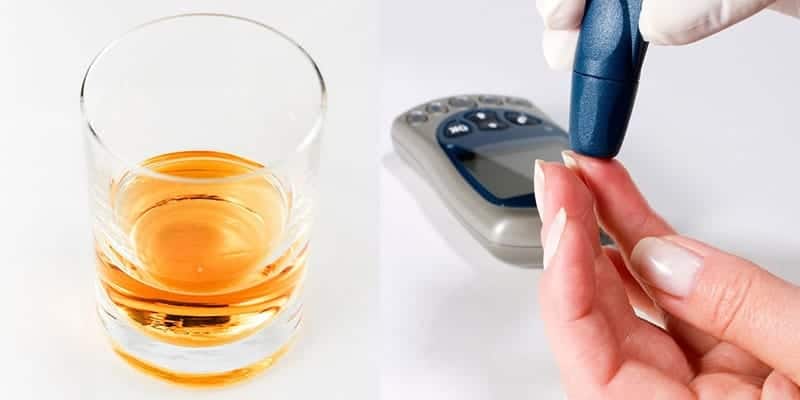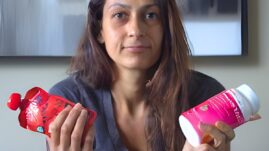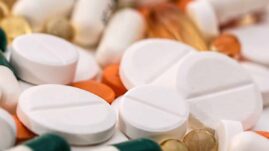Alcohol can affect your blood sugar levels when you live with diabetes, so it’s important to know how to drink safely.

Key facts
- Most people with diabetes can safely drink alcohol in moderation.
- Hypoglycemia (low blood sugar) is a serious acute complication of drinking alcohol, especially when alcohol is consumed on an empty stomach.
- Hyperglycemia (high blood sugar) can also occur due to drinking alcoholic beverages high in carbohydrates and eating higher-carb foods at the same time.
- Heavy drinking can worsen diabetes complications, such as heart disease, neuropathy, and liver disease, and can also lead to weight gain.
How does alcohol affect your blood sugar?
Having diabetes doesn’t necessarily mean that you can’t drink alcohol. But it does mean that you need to be smart about drinking.
Moderate alcohol intake may help to slightly lower blood sugar levels in people with type 2 diabetes and improve insulin sensitivity. This effect is typically observed with moderate consumption, which can enhance insulin action and reduce blood glucose levels.
However, alcohol can have a negative impact on blood sugar levels in people with type 1 and type 2 diabetes if not consumed responsibly. Actions such as excessive drinking or drinking on an empty stomach can lead to both hypoglycemia (low blood sugar) shortly after drinking and hyperglycemia (high blood sugar) later on.
Additionally, alcohol may interact with diabetes medications, further complicating blood sugar management.
Low blood sugars (hypoglycemia)
Shortly after drinking an alcoholic beverage (especially on an empty stomach), blood sugar levels may drop. That’s because the liver is busy processing the alcohol and not paying attention to blood sugar levels, so it stops releasing glucose.
Because of this action, blood sugar levels can drop too low and, sometimes, too quickly. People who take insulin or diabetes pills called sulfonylureas are more likely to experience low blood sugars compared with people who take metformin or other types of diabetes medicines.
Low blood sugar symptoms, which may include slurred speech, behavior changes, drowsiness, or difficulty walking, are also symptoms of drinking too much alcohol. If you need assistance in treating a low blood sugar in this situation, the concern is that others with you may not realize that your blood sugar is low and that you need help.
Other concerns around drinking alcohol and low blood sugars include:
- Hypoglycemia unawareness, a condition in which you don’t feel typical symptoms of low blood sugar. This means that you may not realize that you need to treat the low.
- Low blood sugars that occur hours after your last drink (and that keep occurring, as well).
Drinking too much alcohol can be especially concerning if you have ever used glucagon to treat hypoglycemia. Glucagon is a hormone that raises blood sugars and is often used in people with type 1 diabetes or type 2 diabetes who take insulin when they are unable to swallow liquid or food because of low blood sugar symptoms.
Giving glucagon nasally or by injection may not work to raise your blood sugar if you have been drinking alcohol (especially if you have been drinking excessively). That’s because your liver isn’t paying attention to releasing glucose — it’s busy detoxifying the alcohol.
High blood sugars (hyperglycemia)
While alcohol may lead to an initial drop in blood sugars, you may also find that drinking alcohol leads to an increase in blood sugars. Here’s why:
- Some alcoholic beverages, especially mixed drinks, are high in carbohydrates (carbs). For example, a 6-ounce chocolate martini contains 33 grams of carbs and a 12-ounce piña colada can have as much as 85 grams of carbs.
- You may drink alcohol while eating high-carb foods, especially if you are at a party or special event, such as a wedding.
- Alcohol may interact with diabetes medicines, putting you at risk for either low or high blood sugars, depending on the type of medicine you take and how much alcohol you drink.
Read more in: The Best and Worst Alcoholic Drinks for People With Diabetes.
How to drink alcohol safely if you have diabetes
If you currently drink alcohol or aren’t sure if alcohol is safe for you to drink, it’s best to talk with your healthcare provider about the risks and benefits. Your provider should consider your overall health, how well your diabetes is managed, medications that you are taking, and other health issues you may have.
Many health experts agree that people with diabetes can drink alcohol — in moderation. Here are additional steps that you can take to ensure that you stay safe if you choose to drink:
- Avoid drinking alcohol if you are pregnant, if you are younger than age 21, or if you have health conditions including alcohol use disorder, liver disease, pancreatitis, heart disease, certain digestive diseases, and some mental health disorders.
- Avoid drinking alcohol if your blood sugar is low or if you are at a higher risk for low blood sugars.
- If your blood sugars fluctuate often, say, due to starting a new diabetes medicine, or making changes to your eating or physical activity plan, it may be best to avoid alcohol until your blood sugars stabilize.
- Steer clear of binge drinking, defined as drinking five or more drinks on an occasion for men or four or more drinks on an occasion for women.
- Be careful with drinking if you have been exercising or physically active. The combination of exercise and drinking alcohol greatly increases the risk for hypoglycemia.
- If you do drink, do so in moderation and always drink alcohol with a meal or a snack that contains carbohydrates, especially if you take insulin or a sulfonylurea. Don’t drink on an empty stomach.
- Choose alcoholic beverages wisely. Better choices include light beer, white, red, or sparkling wine, or distilled spirits (gin, vodka, rum) with ice or mixed with water, sparkling water, or diet soda.
- Drink slowly, and if you are planning on having an additional drink, alternate your drinks with water or sparkling water.
- If you are at risk for low blood sugars, always carry a source of fast-acting carbs with you, such as glucose tablets or glucose gel.
- Wear or carry a medical ID to let people know that you have diabetes, especially if you need assistance due to hypoglycemia.
- If you are with other people and plan to drink, let someone know that you have diabetes in case you need assistance.
- Monitor your blood sugars closely before, during, and after you drink alcohol, especially before you go to bed.
- If you take insulin, talk with your healthcare team or diabetes educator about how and when to adjust your insulin doses, if needed, when you drink alcohol. This is particularly important if you have low blood glucose levels overnight after drinking.
- If eligible, consider using a CGM if you consume alcohol regularly, as it can help you manage your blood sugar levels more effectively.
Other safety precautions when drinking
To stay safe when drinking, consider the following steps:
- Wear a medical ID: Let people know that you have diabetes, especially if you need assistance due to hypoglycemia.
- Educate others: Teach someone you’re with about the signs of low blood sugar and how to help you treat it.
- Use a continuous glucose monitor (CGM): Using a CGM can help you monitor your blood sugar levels more effectively, especially if you consume alcohol regularly.
- Have trained assistance: If possible, be with someone who has CPR, AED, and first aid training.
How does drinking alcohol affect your health?
The Harvard T.H. Chan School of Public Health eloquently states, “It’s safe to say that alcohol is both a tonic and a poison.” Why is this? Much of alcohol’s harmful effects are based on the dose — meaning, how much alcohol a person drinks.
Moderate drinking is defined as:
- Up to one drink per day for women
- Up to two drinks per day for men
Heavy or excessive drinking is defined as:
- Eight or more drinks per week for women
- Fifteen or more drinks per week for men
- 12 ounces of beer (regular or light)
- 5 ounces of wine
- 1.5 ounces of spirits (gin, whiskey, vodka, rum)
While drinking in moderation is believed to be safe for most people, heavy drinking can lead to short-term health risks, such as:
- Injuries (car accidents, falls, drownings, burns)
- Violence
- Alcohol poisoning
- Miscarriage and stillbirth
- Weight gain
Longer-term consequences of excess alcohol intake can lead to chronic diseases and other problems:
- Heart disease, stroke, high blood pressure
- Liver disease
- Digestive problems
- Some types of cancer
- Learning and memory problems
- Depression and anxiety
- Social problems
- Alcohol use disorders or alcohol dependence
Of note, alcohol affects women differently than men. Why? Women tend to be smaller than men and have less total body water and more total body fat. Because of this, blood alcohol concentration rises faster and stays higher longer in women than men. Consequently, women are more susceptible to long-term health problems due to alcohol than men.
Some health experts and health organizations (including the World Health Organization) state that no amount of alcohol is safe for health.
But some research points to moderate alcohol intake as possibly protecting against heart disease by increasing HDL (“good”) cholesterol, reducing plaque buildup in arteries, and preventing blood clots. Moderate drinking may even lower the risk of type 2 diabetes.
What are other risks of drinking alcohol if you have diabetes?
Along with the higher risk of heart disease, stroke, and cancer, drinking alcohol can lead to other health issues for people with diabetes.
Weight gain
Weight gain is a possibility if you drink alcohol excessively. While a 12-ounce bottle of light beer that contains 100 calories every now and then is unlikely to lead to weight gain, drinking several bottles at one sitting and over the course of a week can quickly add up in calories.
If your drink of preference leans towards fruity or highly sweetened cocktails, on the other hand, even a couple of these drinks enjoyed regularly can contribute to weight gain. For reference, a margarita can weigh in at upwards of 300 calories and a White Russian may contain approximately 400 calories.
See more in: How Many Calories and Carbs Are There in Different Types of Alcohol?
Drinking alcohol may also cause an increase in hunger, thanks to its effect on certain hormones and neurotransmitters. This means that you may be less likely to make healthy food choices and/or limit portions when you drink alcohol.
Ultimately, weight gain can lead to insulin resistance and higher blood sugars, especially if you have type 2 diabetes.
Liver disease
Liver diseases can stem from a variety of factors including having too much weight around your midsection, high cholesterol, high blood pressure, and type 2 diabetes. Also, blood sugar levels that stay high over a long period of time can cause liver damage.
Excess alcohol intake also impacts liver health, leading to conditions such as fatty liver, alcoholic hepatitis, and cirrhosis.
If you have diabetes and have any type of liver disease, your risk of having further liver problems is greatly increased. This is because both diabetes and liver disease can exacerbate each other’s effects, leading to a more rapid progression of liver damage.
Neuropathy
Certain diabetes complications, such as neuropathy (nerve damage) may be worsened by drinking alcohol.
Symptoms like numbness, tingling, and pain are common in neuropathy caused by both diabetes and alcohol, and they can be nearly indistinguishable from one another. According to a study published in 2021 in the journal Diabetes Therapy, nerve damage will continue to progress if a person with neuropathy continues to drink alcohol.
Did you find this article helpful? Click Yes or No below to let us know!






Stephen Prosterman
Great Articles! As a 52 year veteran of diabetes and living a healthy active life the whole way – Diabetes Strong has great advice and well researched articles. The advice and suggestions are spot on! Knowing your blood suger is the key – always. CGM’s and/or frequent testing are the answer to so so much of the problems we face both daily and long term. Keep it up Christel! Amazing work!
Christel Oerum
Thank you – I’m glad you agree
Kevin Stephani
That was a great informative and thorough article. Thanks for sharing all that info. I especially liked the piece where you quoted the spectrum of folks experiences and tricks at the end.
lee
thanks for sharing your thoughts. Your blog is really comprehensive